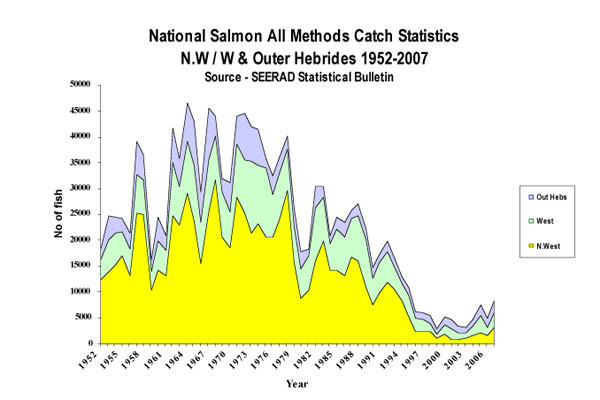A FURIOUS row has broken out between the head of Scotland’s salmon farming industry and the administrators of wild salmon fishing over a denial that salmon production is to blame for declining stocks in the nation’s rivers.
A claim that salmon numbers were already in decline in Scottish waters before the advent of farm cages in 1972, was made by Scott Landsburgh, chief executive of the Scottish Salmon Producers’ Organisation (SSPO).

Interviewed in a BBC television programme last Sunday he was asked directly if cheap farmed fish could harm wild stocks. Landsburgh said:
“There is no scientific evidence to prove this. We have heard this before. Since records began there has been a decline in the number of wild salmon returning to Scottish rivers year on year.”
Yesterday, Andrew Wallace, managing director of the Association of Salmon Fishery Boards (ASFB) in a fierce retort, denounced the statement as “unacceptable.” He said:
“The figures could not be clearer. The trend from 1952 for the whole of Scotland was most definitely upwards and there was no decline until the mid-1970s.”
The ASFB yesterday produced two graphs, based on Government statistics, to counter the SSPO claims. Mr Wallace added:

“The graph for those areas of the west highlands and islands affected by salmon farming shows that there was no decline before 1979 and that this only escalated from the late 1980s coinciding closely with the major expansion of the salmon farming industry.”
The two organisations have been members of the Government-backed Tri-Partite Working Group since it was formed in 1999 in the wake of serious decline in wild fish stocks, to encourage co-operation between various salmon interests.
There has been mounting evidence in recent years of a direct correlation between the location of farm cages in sea lochs near major salmon rivers and the decline in stocks of wild migratory fish. The salmon industry still disputes the evidence.
Mr Wallace said: “It is unacceptable that the chief executive of a major trade body . . . should draw these conclusions when the evidence is so clear.
“One wonders just how the SSPO and its members can justify the expenditure of their own and Government’s time and money on solving a problem he apparently fails to recognise.”
Landsburgh, who joined the SSPO 11 months ago, said last night he was surprised with the ASFB’s assertions. He said:
“They run counter to the recently-published scientific report that was supported by the Scottish Government and wild fisheries representatives, which clearly states that official ‘catch records indicate that the broader scale fishery declines commenced before salmon farming became established.”
Prior to joining the SSPO, Landsburgh was chief executive of the Scottish Grocers’ Federation.

